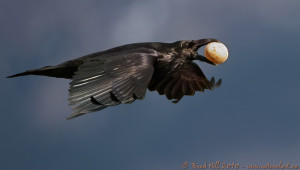February 1990 in Iqaluit, on Baffin Island, Canada. Activities have slowed down a bit today. A temperature of -43C combined with 35 mph north-west winds means that the wind chill factor has gone down to -85C (NOAA Wind Chill Chart). We see far fewer pedestrians and even less motor vehicles on the city’s few roads. Many engines refuse to start and the motor oil has almost the consistency of maple taffy.
A special day indeed as, from the Transport Canada flight service station (FSS) tower, we can watch a very interesting performance. Huge ravens have picked that very windy day to have fun, regardless of the temperature. Flying under the wind near the FSS cab, they benefit from the venturi effect. There is no need flapping their wings. They just glide while occasionally correcting the angle of attack to adjust for the gusting wind.
The wind chill factor affecting living organisms, I find it quite spectacular to see those huge black birds having fun while we would expect that, with a -85C factor, ravens which must not absolutely fly would stay under cover until the weather improves a bit.
We can clearly hear the noise made by the wind on the wings of a huge raven when it glides over us. One day, I was walking near the Apex village under total silence. Suddenly I heard a raven glide low over my head. He was possibly checking if there was anything eatable out of that deformed shape transformed by multiple layers of winter clothing. There was only the rustling of the wind on its large open wings and no other sound. That was a very special experience.
For more real life stories as a FSS in Iqaluit, click on the following link: Flight service specialist (FSS) in Iqaluit

